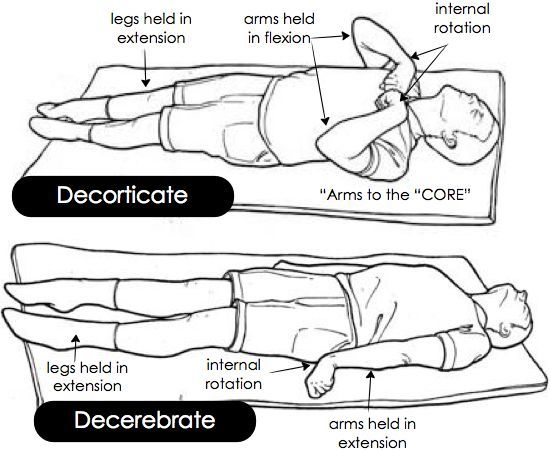Posturing
Published .

Decorticate posture is an abnormal posturing in which a person is stiff with bent arms, clenched fists, and legs held out straight. The arms are bent in toward the body and the wrists and fingers are bent and held on the chest. This type of posturing is a sign of severe damage in the brain.
Considerations
Decorticate posture is a sign of damage to the nerve pathway in the midbrain, which is between the brain and spinal cord. The midbrain controls motor movement. Although decorticate posture is serious, it is usually not as serious as a type of abnormal posture called decerebrate posture.
The posturing may occur on one or both sides of the body.
Causes
Causes of decorticate posture include:
- Bleeding in the brain from any cause
- Brain stem tumor
- Stroke
- Brain problem due to drugs, poisoning, or infection
- Traumatic brain injury
- Brain problem due to liver failure
- Increased pressure in the brain from any cause
- Brain tumor
- Infection, such as Reye syndrome
- Brain injury from lack of oxygen
Decerebrate posture
Decerebrate posture is an abnormal body posture that involves the arms and legs being held straight out, the toes being pointed downward, and the head and neck being arched backward. The muscles are tightened and held rigidly. This type of posturing usually means there has been severe damage to the brain.
Considerations
A severe injury to the brain is the usual cause of decerebrate posture.
Decerebrate posture can occur on one side, on both sides, or in just the arms. It may alternate with another type of abnormal posture called decorticate posture. A person can also have decorticate posture on one side of the body and decerebrate posture on the other side.
Causes
Causes of decerebrate posture include:
- Bleeding in the brain from any cause
- Brain stem tumor
- Stroke
- Brain problem due to illicit drugs, poisoning, or infection
- Traumatic brain injury
- Brain problem due to liver failure
- Increased pressure in the brain from any cause
- Brain tumor
- Infections, such as meningitis
- Reye syndrome (sudden brain damage and liver function problems that affects children)
- Brain injury from lack of oxygen
